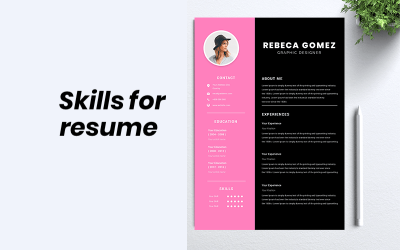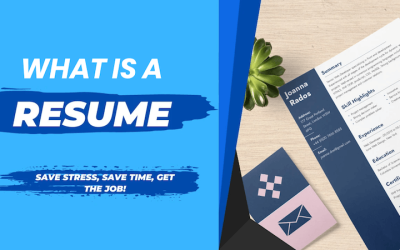In a mere eight seconds, recruiters review your CV, making it crucial to ensure it catches their attention for the right reasons. Learn how to craft an effective CV and uncover valuable tips to increase your chances of advancing to the interview stage.
What is a CV?
A CV, short for curriculum vitae (a Latin term meaning ‘course of life’), serves as a job application document summarizing your education, skills, and pertinent work experience to present your abilities effectively to potential employers. Along with your CV, employers may request a cover letter.
In countries like the USA and Canada, CVs are referred to as résumés. These documents are typically more concise and do not follow specific formatting rules.
What is your English level?
Find out your A1 A2 B1 B2 C1 C2 level of English with our online test and receive your English certificate.
How long should a CV be?
A standard CV in the UK is typically limited to two sides of A4. We offer a chronological CV as an example for you to draw inspiration from.
However, it’s essential to recognize that one size does not fit all. For instance, school leavers or recent graduates with minimal experience may only require one side of A4. On the other hand, individuals in high-level positions or those with extensive experience across multiple jobs over the past five to ten years may need a three-page CV. Specific fields like medicine or academia might also necessitate longer CVs, depending on the individual’s experience. While maintaining conciseness is crucial, it’s equally important to avoid underselling your experience.
When writing your CV, focus on including key points about your education and experience to save space. Stick to relevant information and refrain from repeating details already present in your cover letter. If you encounter challenges in editing your CV, assess whether certain information truly highlights your strengths. If not, remove it. Additionally, if certain details are outdated or irrelevant to the job you’re applying for, consider deleting or summarizing them.
What should I include in my CV?
Contact Details – Your full name, home address, mobile number, and email address should be included. Date of birth is irrelevant, and unless applying for an acting or modeling job, a photograph is unnecessary. If you have a professional networking profile, website, or online portfolio, provide a link within your contact details.
Profile – A CV profile is a concise statement that highlights your key attributes, helping you stand out. Typically placed at the beginning of a CV, it emphasizes relevant achievements, skills, and career goals. Ensure your CV profile aligns with the specific sector you’re applying for, as your cover letter will be tailored to the job.
Education – List your previous education and professional qualifications, starting with the most recent. Include qualification type, grades, and dates. Specify relevant modules only.
Work Experience – Present your work experience in reverse chronological order, focusing on its relevance to the job you’re seeking. Mention your job title, company name, tenure, and key responsibilities. If you have substantial relevant work experience, prioritize this section over education.
Skills and Achievements – Highlight your foreign language proficiency and IT competencies, ensuring they are relevant to the job. Avoid exaggeration and be prepared to substantiate your claims during an interview. If you possess numerous job-specific skills, consider using a skills-based CV format.
Interests – Instead of generic activities like ‘socializing’ or ‘reading,’ mention interests that offer a more complete view of who you are and can provide discussion points during an interview. Relevant hobbies could demonstrate your suitability for the role, such as writing a blog for aspiring journalists or being part of a drama group for those pursuing a sales career. If you lack relevant hobbies, omit this section.
References – At this stage, there is no need to provide the names of referees. You can state ‘references available upon request,’ but most employers assume this to be the case, so it’s acceptable to leave this out if you are short on space.
Are you C1 Advanced English?
Get your C1 Advanced English certificate now!
✓ Add your certificate to your resume
⭐ ⭐ ⭐ ⭐ ⭐
How do I format a CV?
The layout of your CV plays a significant role in its effectiveness. Consider the following tips when creating your CV:
- Avoid using the titles ‘curriculum vitae’ or ‘CV,’ as it wastes space. Instead, let your name serve as the title.
- Make use of section headings to organize your CV effectively. Ensure they stand out by using a larger and bold font size, such as 14 or 16.
- Opt for professional, clear, and easily readable fonts like Arial, Calibri, or Times New Roman. Use font sizes between 10 and 12 to ensure potential employers can easily read your CV, and maintain consistency in all fonts and font sizes throughout.
- List your experiences and achievements in reverse chronological order, so recruiters see your work history and most recent accomplishments first.
- Use bullet points to maintain conciseness. This CV layout enables potential employers to quickly extract essential information.
- Double-check your margins and aim for 2.5-centimeter margins all around. Sufficient white space around your CV improves readability and prevents clutter.
- Name the document meaningfully when saving, such as ‘Joe-Smith-CV,’ instead of generic titles like ‘Document 1.’
- Save the file with a .PDF extension to ensure it can be opened and read on any device. However, if the job advert specifies otherwise, follow the instructions accordingly (e.g., providing your CV and cover letter as a Word document).
How do I write a good CV?
Use active verbs whenever possible. Incorporate words like ‘created,’ ‘analyzed,’ and ‘devised’ to showcase your initiative and proactivity.
Ensure your CV is free of spelling and grammar errors. Utilize a spell checker and ask someone else to review the document.
Avoid using generic and overused phrases like ‘team player,’ ‘hardworking,’ and ‘multitasker.’ Instead, provide concrete examples that demonstrate these skills in action.
Customize your CV for each application. Research the company, review their website and social media accounts, and take note of recent mentions in the local press. Tailor your CV to match the specific role and employer.
Select the appropriate CV type based on your circumstances—choose between the chronological, skills-based, or academic CV format.
Use a professional-sounding email address. If your personal address is unsuitable, create a new one for professional use.
Be truthful on your CV and job application. Lying or exaggerating can not only harm your chances of getting hired but may also have serious consequences, such as degree fraud.
When posting your CV online, refrain from including your home address to avoid being targeted by fraudsters.
Always include a cover letter unless explicitly stated otherwise by the employer. A cover letter allows you to personalize your application, draw attention to specific aspects of your CV, disclose any disabilities, or address gaps in your work history.
FAQ: How To Write A CV
What is the first step in writing a CV?
The first step in writing a CV is to gather all your relevant information, including educational background, work experience, skills, and achievements.
How should I format my CV to make it stand out?
To make your CV stand out, use a clean and professional format with clear section headings. Choose a legible font and maintain consistency throughout.
What should I include in the skills section of my CV?
In the skills section, include both hard and soft skills that are relevant to the job you are applying for. Use bullet points to highlight your key abilities.
Should I include a summary or objective statement on my CV?
Yes, a brief summary or objective statement can give potential employers a quick overview of your career goals and what you can bring to the table.
How long should my CV be?
Ideally, your CV should be one to two pages long. Keep it concise and focus on relevant information that showcases your qualifications and achievements.
What is your English level?
Find out your A1 A2 B1 B2 C1 C2 level of English with our online test and receive your English certificate.
I am Nilay, an experienced English Language Assessment Director at the International English Test, where I have been working full-time since February 2020. I specialize in helping people worldwide validate their English proficiency through comprehensive assessments and certifications.
Before joining the International English Test, I worked as a self-employed English Language Assessment Consultant from January 2015 to December 2019. During this time, I assisted companies and individuals in improving their language skills, helping them achieve their academic and professional goals.
I hold a degree in Engineering and have also studied at Shafston International College in Australia. My educational background has equipped me with the tools to make a meaningful impact in the field of English language learning. Additionally, I enjoy sharing my expertise through articles that explore effective teaching methods and language assessment strategies, contributing to the International English Test and the broader assessment community.





